
5 Strategies for Success When Teaching Online
- Subject:
- Educational Technology
- Higher Education
- Material Type:
- Teaching/Learning Strategy
- Author:
- Jacob Spradlin
- Date Added:
- 09/28/2023
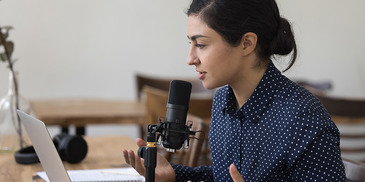
The "Foundations of Digital Learning Resource Collection" is a carefully curated and comprehensive compilation of Open Educational Resources (OER) dedicated to providing a solid understanding of the fundamental concepts, theories, and principles that underpin digital learning. This collection serves as an invaluable resource for educators, instructional designers, students, and anyone interested in delving into the core components of digital education.

5 Strategies for Success When Teaching Online
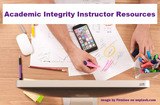
Academic cheating is a growing problem in educational institutions around the world, and it can take many forms, including plagiarism, collusion, and cheating during exams. Academic cheating can have serious consequences for students, educators, and the academic community as a whole.The Academic Integrity Instructor Resource Platform is a growing and evolving online resource designed to support and promote academic integrity among faculty members. This resource serves as a go-to platform for faculty seeking guidance, tools, and best practices to foster a culture of academic honesty and prevent plagiarism and cheating within their online, online-live, hybrid, and face-to-face, classrooms.
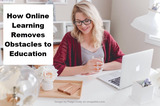
Activity Sheet: This document provides an overview of how online education helps remove common barriers to accessing education, such as geographical restrictions, disabilities, scheduling conflicts, social stigma, and financial constraints. It uses simple icons and explanations to illustrate how the flexibility and accessibility of online learning platforms can expand educational opportunities to a broader range of students. This would be a useful resource for those exploring online education options, comparing modalities, or looking to increase enrollment through distance learning programs.
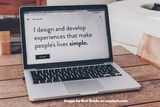
This is an informational document providing an overview of Anthology Ally and its features for improving accessibility of digital course content in higher education. It covers background on accessibility regulations, a history of Anthology Ally, key terms and concepts used in the tool, and ways Ally enables engagement between instructional designers, faculty, students, and administrators to enhance inclusion. The document was created with assistance from an AI tool.

An infographic with Quick Facts on AI in higher education by Mandy Jordan, Researcher, SHSU Online
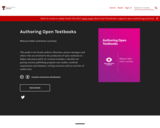
"This guide is for faculty authors, librarians, project managers and others who are involved in the production of open textbooks in higher education and K-12. It includes a checklist for getting started, publishing program case studies, textbook organization and elements, writing resources and an overview of useful tools.
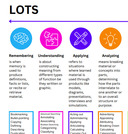
An infographic detailing the new version of Bloom's Taxonomy for digital use. Originally created by the Global Digital Citizen Foundation. Created by Ascend at Los Angeles Pacific University.
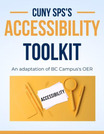
The goal of this adapted version of BC Campus's Accessibility Toolkit - 2nd Edition is to provide resources for each content creator, instructional designer, educational technologist, librarian, administrator, and teaching assistant to create truly open textbooks and online academic experiences—ones that are free and accessible for all students. The original source was a collaboration between BCcampus, Camosun College, and CAPER-BC.

A helpful checklist for instructors who find themselves suddenly shifting to online instruction.

The attached file is a course schedule or outline template in a Word document. It contains a table with columns for week, dates, topic, and activities/assignments. The table has rows for each week of a 15 week course, with dates, topics, and placeholder activities and assignments filled in.
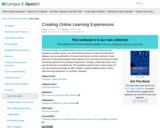
This book provides an updated look at issues that comprise the online learning experience creation process. As online learning evolves, the lines and distinctions between various classifications of courses has blurred and often vanished. Classic elements of instructional design remain relevant at the same time that newer concepts of learning experience are growing in importance. However, problematic issues new and old still have to be addressed. This handbook explores many of these topics for new and experienced designers alike, whether creating traditional online courses, open learning experiences, or anything in between.

This customizable Excel template provides a master framework to plan and organize learning activities for online courses. The template contains sheets to outline course modules, schedule weekly learning objectives and activities, plan assessments and assignments, and track student progress. Columns are provided to capture activity details like name, type, description, duration, assignments, and more. The template is fully editable so course designers can add or remove sheets as needed to match their planning process. By providing a structured planning template, this Excel file aims to help streamline the instructional design process for online learning. Use it to map out engaging and effective learning experiences for modern online courses.

Approaching the end of an academic semester necessitates a multi-faceted strategy that encompasses academic, organizational, and technological considerations. To assist you in effectively managing this transition, we present a thorough guide geared towards facilitating a smooth end-of-semester experience.
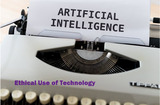
This book is the result of a co-design project in a class in the Masters of Education program at the University of Calgary. The course, and the resulting book, focus primarily on the safe and ethical use of technology in digital learning environments. The course was organized according to four topics based on Farrow’s (2016) Framework for the Ethics of Open Education and discusses Artificial Intelligence (AI) , social networking services (SNS), 3D printing, resource sharing, adaptive learning systems, STEM, assistive technologies, admissions, and communications. In each of the nine chapters, the authors discuss the connection to the value of technology in education, and practical possibilities of learning technologies for inclusive, participatory, democratic, and pluralistic educational paradigms.
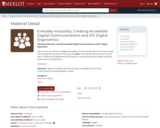
Everyday Inclusivity: Creating Accessible Digital Communications and DIY Digital Ergonomics
Learn how to use elements of Digital Accessibility, Universal Design (UD) and Universal Design for Learning (UDL) concepts to make your life easier in this special interactive lunch & Learn event. Professional Development and Education for Nursing Instructional Design Consultant (Instructional Learning Senior) Irene Knokh demonstrates how to get the most out of Windows and Microsoft accessibility tools to better engage and communicate with all your stakeholders. She shares her favorite tools, links for accessibility, and answers your questions about how to communicate clearer in daily emails and through Slack/Teams. This session will be closed-captioned.

Presentation of ethnographic research on AI in higher education and future jobs.

Whether you're a faculty member transitioning to remote teaching or a student taking online classes, setting up a productive workspace at home becomes increasingly important. Achieving this on a budget doesn't have to be a daunting task. This guide aims to equip you with the knowledge to create a home workspace that focuses on key aspects such as effective technology, ergonomic furniture, and essential accessories.
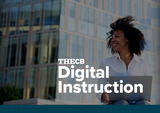
This guide is designed to help educators navigate the Digital Instruction Hub on OERTX and discover how to incorporate Open Educational Resources (OER) into their courses to foster interactive and inclusive learning experiences.

In a technology-driven environment, we assume most people are comfortable learning online. The ubiquity of digital communication, automated assistance, and constant connectivity support this assumption, but many of us lack the skills needed to navigate digital resources and technologies in an academic setting. Learning in a Digital Age (LiDA) is a credit-bearing course designed to improve digital learning literacies for higher education and help learners gain more value from open educational resources (OER).
In this course, you will develop the digital and learning literacies to maximize their learning in a contemporary digital learning environment for higher education. You will develop the academic skills to discern the credibility, accuracy, and integrity of open access resources available on the Internet and corresponding digital tools to research, analyze, and present information for academic purposes.
You will also develop competence in a range of digital tools, including social media, communication and collaboration tools, and publishing tools to support learning in contemporary society. This will include knowledge of copyright, open licensing, media literacy, and digital citizenship.
This course is offered concurrently in partnership with OERu. You are more than welcome to work through all four sections at your own pace, but you may be able to interact with more students if you follow the schedule used by OERu and their community of learners.
This course includes the following sections:
Digital Skills for Online Learning (LiDA101)
Digital Citizenship (LiDA102)
Open Education, Copyright, and Open Licensing in a Digital World
Critical Media Literacy and Associated Digital Skills (LiDA104)
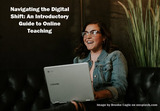
Introducing "Navigating the Digital Shift: An Introductory Guide to Online Teaching," a comprehensive mini eBook meticulously designed to facilitate professors in transitioning seamlessly to online or digital instruction. This invaluable resource serves as a beacon for educators venturing into the realms of virtual teaching, providing concise, practical insights coupled with actionable tools to navigate the digital education landscape effectively. Within its pages, professors will uncover a plethora of practical tables, user-friendly templates, and detailed checklists, each crafted to demystify the online teaching process and ensure a smooth transition. Whether you're a seasoned educator or a newcomer to the teaching profession, this guide offers tailored solutions, best practices, and innovative strategies to set up every new online instructor for unparalleled success. Dive into the world of online instruction with confidence, equipped with the knowledge and tools necessary to create engaging, inclusive, and effective learning experiences in the virtual classroom.